初中英语语法--表示时间的介词on,in,at
时间介词In、on、at在课堂上的应用
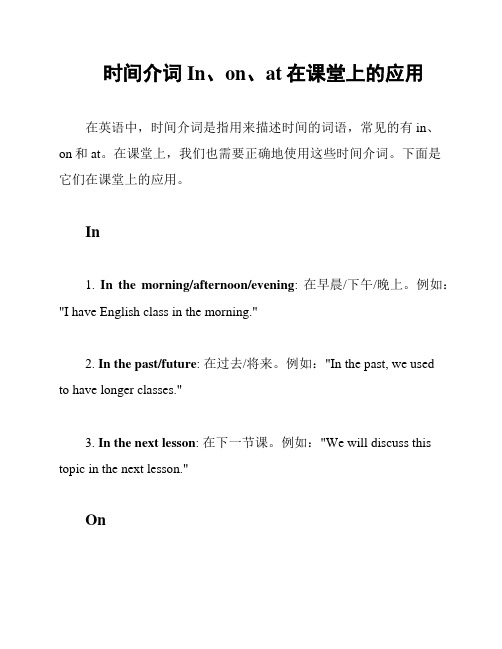
时间介词In、on、at在课堂上的应用在英语中,时间介词是指用来描述时间的词语,常见的有in、on和at。
在课堂上,我们也需要正确地使用这些时间介词。
下面是它们在课堂上的应用。
In1. In the morning/afternoon/evening: 在早晨/下午/晚上。
例如:"I have English class in the morning."2. In the past/future: 在过去/将来。
例如:"In the past, we usedto have longer classes."3. In the next lesson: 在下一节课。
例如:"We will discuss this topic in the next lesson."On1. On Monday/Tuesday/Wednesday, etc.: 在星期一/星期二/星期三等。
例如:"We have a test on Friday."2. On the first/second/third, etc. day of the week: 在星期的第一/第二/第三等天。
例如:"On the first day of the week, we review previous lessons."3. On a specific date: 在具体日期。
例如:"Our final exam is on December 15th."At1. At a specific time: 在具体时间。
例如:"The class starts at 9 o'clock."2. At the beginning/end of the class: 在课堂的开始/结束时。
例如:"At the beginning of the class, we will review homework."3. At the same time: 同时。
初中英语语法介词
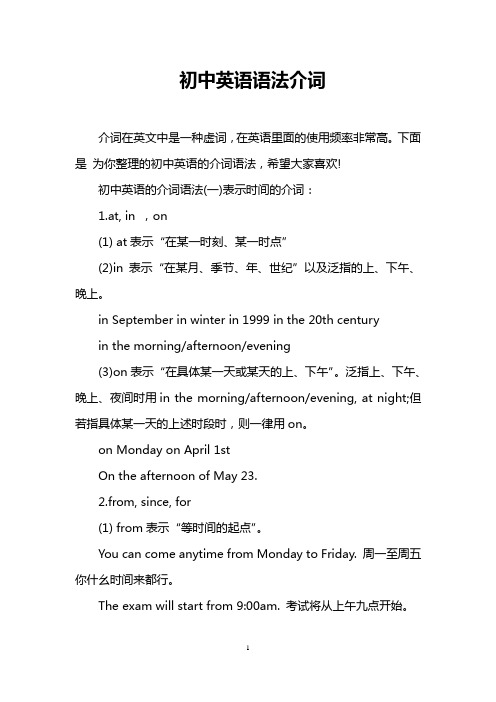
初中英语语法介词介词在英文中是一种虚词,在英语里面的使用频率非常高。
下面是为你整理的初中英语的介词语法,希望大家喜欢!初中英语的介词语法(一)表示时间的介词:1.at, in ,on(1) at表示“在某一时刻、某一时点”(2)in表示“在某月、季节、年、世纪”以及泛指的上、下午、晚上。
in September in winter in 1999 in the 20th centuryin the morning/afternoon/evening(3)on表示“在具体某一天或某天的上、下午”。
泛指上、下午、晚上、夜间时用in the morning/afternoon/evening, at night;但若指具体某一天的上述时段时,则一律用on。
on Monday on April 1stOn the afternoon of May 23.2.from, since, for(1) from表示“等时间的起点”。
You can come anytime from Monday to Friday. 周一至周五你什幺时间来都行。
The exam will start from 9:00am. 考试将从上午九点开始。
(2) since表示“自从……以来(直到现在)”He has been away from home since 1973. 他自从1973年就离开了家乡。
We have known each other since ten years ago.我们十年前就认识了。
(3) for 与since表示一段时间,但for与时间段连用,而since 与时间点连用。
for two hours since last week3.after, in, within(1) after表示“在……之后”,是before的反义词。
初中英语语法学习之介词与介词短语讲义
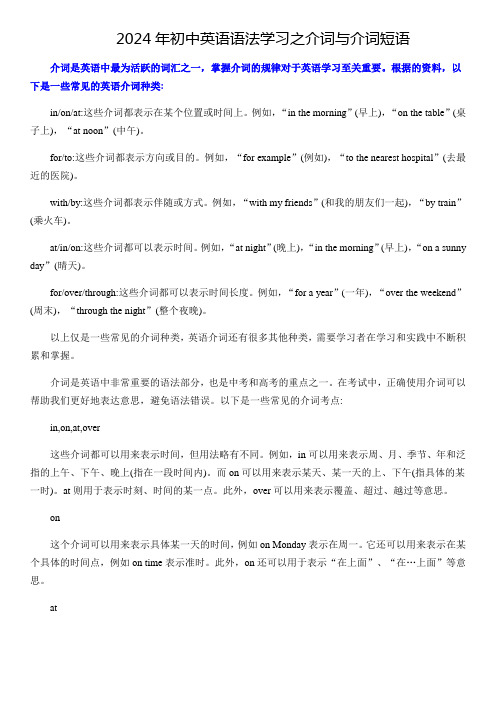
2024年初中英语语法学习之介词与介词短语介词是英语中最为活跃的词汇之一,掌握介词的规律对于英语学习至关重要。
根据的资料,以下是一些常见的英语介词种类:in/on/at:这些介词都表示在某个位置或时间上。
例如,“in the morning”(早上),“on the table”(桌子上),“at noon”(中午)。
for/to:这些介词都表示方向或目的。
例如,“for example”(例如),“to the nearest hospital”(去最近的医院)。
with/by:这些介词都表示伴随或方式。
例如,“with my friends”(和我的朋友们一起),“by train”(乘火车)。
at/in/on:这些介词都可以表示时间。
例如,“at night”(晚上),“in the morning”(早上),“on a sunny day”(晴天)。
for/over/through:这些介词都可以表示时间长度。
例如,“for a year”(一年),“over the weekend”(周末),“through the night”(整个夜晚)。
以上仅是一些常见的介词种类,英语介词还有很多其他种类,需要学习者在学习和实践中不断积累和掌握。
介词是英语中非常重要的语法部分,也是中考和高考的重点之一。
在考试中,正确使用介词可以帮助我们更好地表达意思,避免语法错误。
以下是一些常见的介词考点:in,on,at,over这些介词都可以用来表示时间,但用法略有不同。
例如,in可以用来表示周、月、季节、年和泛指的上午、下午、晚上(指在一段时间内)。
而on可以用来表示某天、某一天的上、下午(指具体的某一时)。
at则用于表示时刻、时间的某一点。
此外,over可以用来表示覆盖、超过、越过等意思。
on这个介词可以用来表示具体某一天的时间,例如on Monday表示在周一。
它还可以用来表示在某个具体的时间点,例如on time表示准时。
初中英语语法(in、on、of、with、by、at等用法汇总)
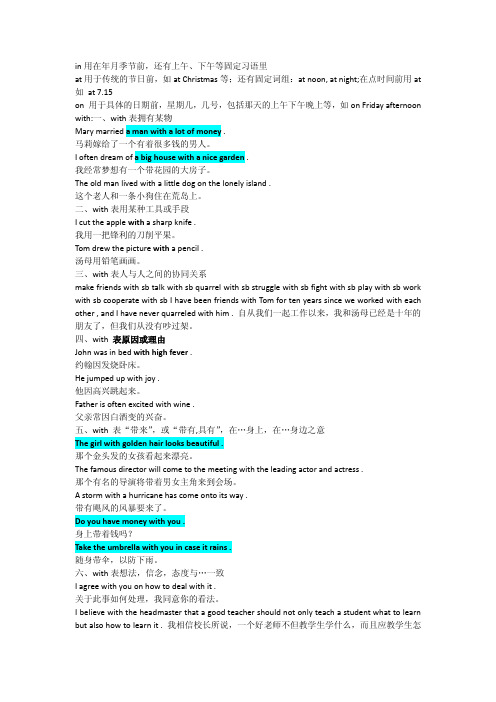
in用在年月季节前,还有上午、下午等固定习语里at用于传统的节日前,如at Christmas等;还有固定词组:at noon, at night;在点时间前用at 如at 7.15on 用于具体的日期前,星期几,几号,包括那天的上午下午晚上等,如on Friday afternoon with:一、with表拥有某物Mary married a man with a lot of money .马莉嫁给了一个有着很多钱的男人。
I often dream of a big house with a nice garden .我经常梦想有一个带花园的大房子。
The old man lived with a little dog on the lonely island .这个老人和一条小狗住在荒岛上。
二、with表用某种工具或手段I cut the apple with a sharp knife .我用一把锋利的刀削平果。
Tom drew the picture with a pencil .汤母用铅笔画画。
三、with表人与人之间的协同关系make friends with sb talk with sb quarrel with sb struggle with sb fight with sb play with sb work with sb cooperate with sb I have been friends with Tom for ten years since we worked with each other , and I have never quarreled with him . 自从我们一起工作以来,我和汤母已经是十年的朋友了,但我们从没有吵过架。
四、with 表原因或理由John was in bed with high fever .约翰因发烧卧床。
He jumped up with joy .他因高兴跳起来。
课件初中英语语法--表示时间的介词on,in,at

in May
in the past/future
in the next
centuryin Summ Nhomakorabear In England, it often snows in December. Do you think we will go to Jupiter in the future? There should be a lot of progress in the next century.
PREPOSITIONS OF TIME: AT, IN, ON
We use:
at for a PRECISE TIME
at 3 o'clock at sunrise at dinnertime at the moment
at 10.30am at bedtime at noon at sunset
Prepositions of time
Notice the use of the prepositions of time in and on in these common expressions:
in in the morning in the mornings in the afternoon(s) in the evening(s)
on on Tuesday morning on Saturday mornings on Sunday afternoons on Monday evening
When we say last, next, every, this we do not also use at, in, on.
I went to London last June. (not in last June) He's coming back next Tuesday. (not on
初中英语语法梳理和提高——介词讲解试题
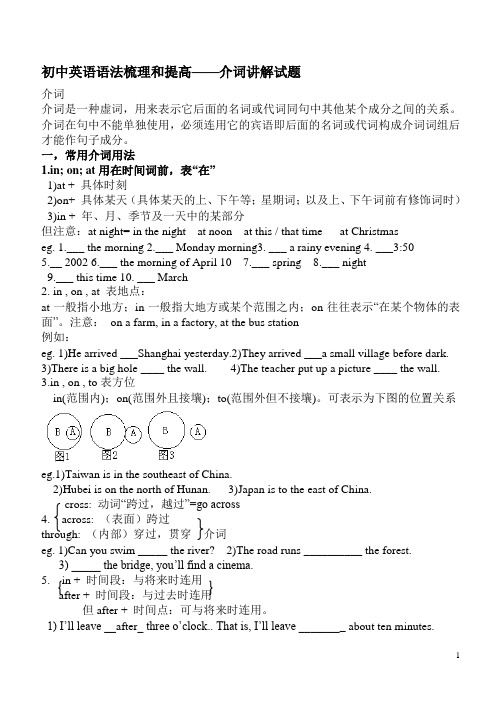
初中英语语法梳理和提高——介词讲解试题介词介词是一种虚词,用来表示它后面的名词或代词同句中其他某个成分之间的关系。
介词在句中不能单独使用,必须连用它的宾语即后面的名词或代词构成介词词组后才能作句子成分。
一,常用介词用法1.in; on; at用在时间词前,表“在”1)at + 具体时刻2)on+ 具体某天(具体某天的上、下午等;星期词;以及上、下午词前有修饰词时)3)in + 年、月、季节及一天中的某部分但注意:at night= in the night at noon at this / that time at Christmaseg. 1.___ the morning 2.___ Monday morning3. ___ a rainy evening 4. ___3:505.__ 20026.___ the morning of April 107.___ spring8.___ night9.___ this time 10. ___ March2. in , on , at 表地点:at一般指小地方;in一般指大地方或某个范围之内;on往往表示“在某个物体的表面”。
注意:on a farm, in a factory, at the bus station例如:eg. 1)He arrived ___Shanghai yesterday.2)They arrived ___a small village before dark. 3)There is a big hole ____ the wall. 4)The teacher put up a picture ____ the wall.3.in , on , to表方位in(范围内);on(范围外且接壤);to(范围外但不接壤)。
可表示为下图的位置关系eg.1)Taiwan is in the southeast of China.2)Hubei is on the north of Hunan. 3)Japan is to the east of China.cross: 动词“跨过,越过”=go across4. across: (表面)跨过through: (内部)穿过,贯穿介词eg. 1)Can you swim _____ the river? 2)The road runs __________ the forest.3) _____ the bridge, you’ll find a cinema.5. in + 时间段:与将来时连用after + 时间段:与过去时连用但after + 时间点:可与将来时连用。
(完整版)初中英语语法介词用法讲解与练习
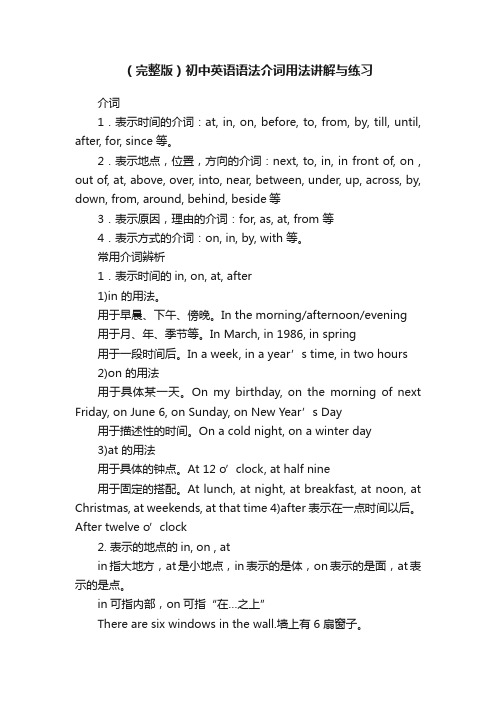
(完整版)初中英语语法介词用法讲解与练习介词1.表示时间的介词:at, in, on, before, to, from, by, till, until, after, for, since 等。
2.表示地点,位置,方向的介词:next, to, in, in front of, on , out of, at, above, over, into, near, between, under, up, across, by, down, from, around, behind, beside等3.表示原因,理由的介词:for, as, at, from 等4.表示方式的介词:on, in, by, with 等。
常用介词辨析1.表示时间的in, on, at, after1)in 的用法。
用于早晨、下午、傍晚。
In the morning/afternoon/evening用于月、年、季节等。
In March, in 1986, in spring用于一段时间后。
In a week, in a year’s time, in two hours2)on 的用法用于具体某一天。
On my birthday, on the morning of next Friday, on June 6, on Sunday, on New Year’s Day用于描述性的时间。
On a cold night, on a winter day3)at 的用法用于具体的钟点。
At 12 o’clock, at half nine用于固定的搭配。
At lunch, at night, at breakfast, at noon, at Christmas, at weekends, at that time 4)after 表示在一点时间以后。
After twelve o’clock2. 表示的地点的in, on , atin指大地方,at是小地点,in表示的是体,on表示的是面,at表示的是点。
in.on.at的用法
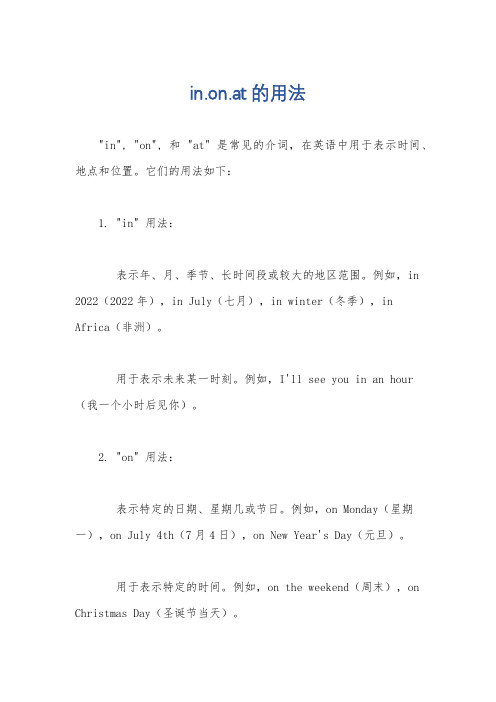
in.on.at的用法
"in", "on", 和 "at" 是常见的介词,在英语中用于表示时间、地点和位置。
它们的用法如下:
1. "in" 用法:
表示年、月、季节、长时间段或较大的地区范围。
例如,in 2022(2022年),in July(七月),in winter(冬季),in Africa(非洲)。
用于表示未来某一时刻。
例如,I'll see you in an hour (我一个小时后见你)。
2. "on" 用法:
表示特定的日期、星期几或节日。
例如,on Monday(星期一),on July 4th(7月4日),on New Year's Day(元旦)。
用于表示特定的时间。
例如,on the weekend(周末),on Christmas Day(圣诞节当天)。
3. "at" 用法:
表示具体的时间。
例如,at 3 o'clock(3点钟),at noon(中午),at midnight(午夜)。
用于表示特定的地点或位置。
例如,at the bus stop(在公交车站),at the door(在门口)。
需要注意的是,这些介词的使用有时候是固定搭配,需要根据具体语境来判断。
希望这些解释能帮助你更好地理解它们的用法。
- 1、下载文档前请自行甄别文档内容的完整性,平台不提供额外的编辑、内容补充、找答案等附加服务。
- 2、"仅部分预览"的文档,不可在线预览部分如存在完整性等问题,可反馈申请退款(可完整预览的文档不适用该条件!)。
- 3、如文档侵犯您的权益,请联系客服反馈,我们会尽快为您处理(人工客服工作时间:9:00-18:30)。
Notice the use of the preposition of time at in the
following standard expressions:
Expression
Example
at night
The stars shine at night.
at the weekend*
I don't usually work at the weekend.
Prepositions of time
Notice the use of the prepositions of time in and on in these common expressions:
in in the morning in the mornings in the afternoon(s) in the evening(s)
I have a meeting at 9am. The shop closes at midnight. Jane went home at lunchtime.
We use:
in for MONTHS, YEARS, CENTURIES and LONG PERIODS.
✓in the Summer ✓in the Ice Age ✓in the 1990s ✓in 1990
next Tuesday) I go home every Easter. (not at every Easter) We'll call you this evening. (not in this evening)
Remember:
in for larger periods of time. on for small periods of time . at for precise periods of time .
We use:
on for DAYS and DATES
on Sunday on Tuesdays on 6 March on 25 Dec. 2010
on Sunday on Tuesdays on 6 March on 25 Dec. 2010
Do you work on Mondays? Her birthday is on 20 November. Where will you be on New Year's Day?
at Christmas*/Easter I stay with my family at Christmas.
at the same time
We finished the test at the same time.
at present
He's not home at present. Try later.
✓in May
✓in the past/future
✓in the next
century
✓in Summer
In England, it often snows in December. Do you think we will go to Jupiter in the future? There should be a lot of progress in the next century.
PREPOSITIONS OF TIME: AT, IN, ON
We use:
at for a PRECISE TIME
✓at 3 o'clock ✓at sunrise ✓at dinnertime ✓at thbedtime ✓at noon ✓at sunset
on on Tuesday morning on Saturday mornings on Sunday afternoons on Monday evening
When we say last, next, every, this we do not also use at, in, on.
I went to London last June. (not in last June) He's coming back next Tuesday. (not on
